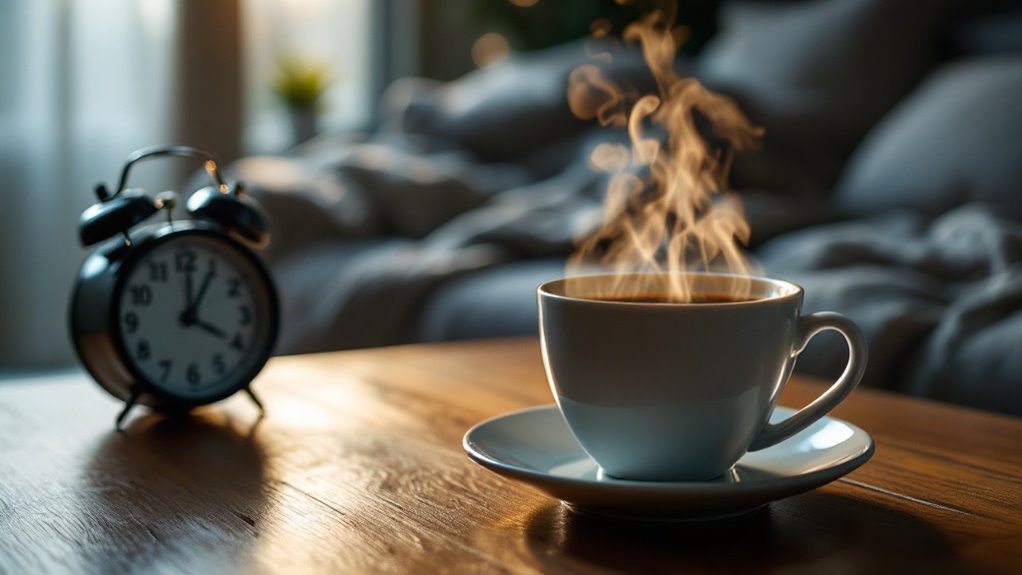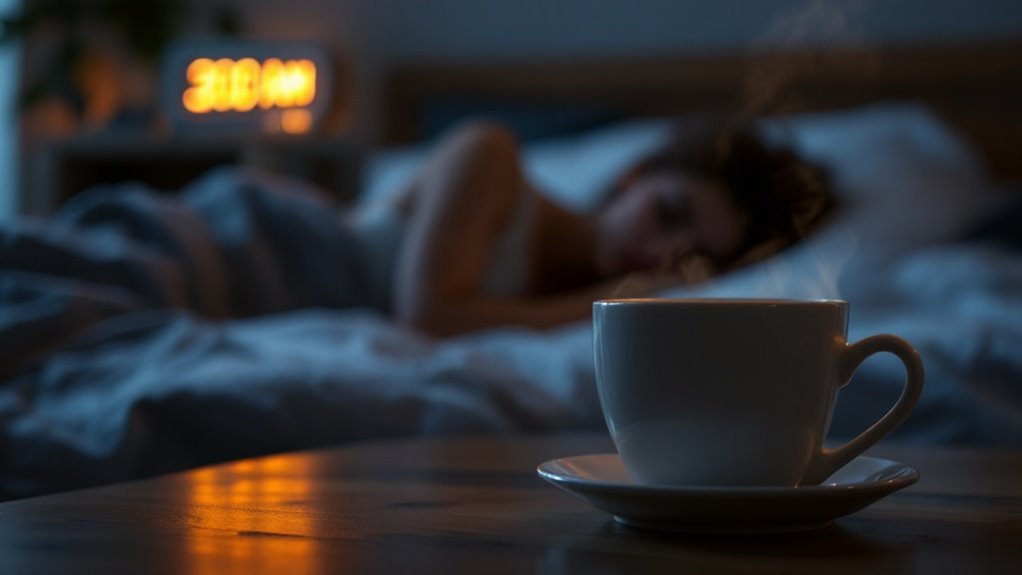



You might think that late-afternoon coffee won't affect your sleep, but caffeine's impact lingers longer than you'd expect. It blocks adenosine, the chemical that signals your brain to rest, keeping you alert when you should be winding down. Even if you finish your cup six hours before bed, it could still shave off precious sleep time. But here's the catch: not everyone reacts the same way. Your genes and metabolism play a role, and over time, regular coffee habits might disrupt your sleep cycle more than you realize. So, how much is too much, and when should you stop? The answers might surprise you.
Key Takeaways
- Caffeine in coffee blocks adenosine receptors, delaying sleep onset and reducing restorative sleep stages like slow-wave sleep.
- Consuming coffee 6 hours before bed reduces sleep time by 41 minutes and increases nighttime wakefulness.
- Caffeine's half-life of 3-7 hours means it can linger in the system, disrupting sleep even when consumed earlier in the day.
- Genetic factors, age, and tolerance levels influence individual sensitivity to caffeine's sleep-disrupting effects.
- Chronic coffee consumption can lead to long-term sleep disturbances, including fragmented rest and delayed circadian rhythms.
How Caffeine Affects Sleep Quality
Because caffeine blocks adenosine receptors, it disrupts the buildup of sleep-inducing chemicals, directly impacting your sleep quality. When you consume coffee or other caffeinated beverages, even 6 hours before bedtime, it can reduce your total sleep time by 41 minutes and increase wakefulness during sleep. Caffeine taken 3 hours before bed delays your ability to fall asleep by over 17 minutes and extends wake time by nearly 28 minutes. It also decreases sleep efficiency and reduces combined stage 1 and 2 sleep by 40 to 44 minutes. These effects persist regardless of the time of day you consume caffeine, making it harder to achieve restorative sleep. To minimize interference with sleep, avoid caffeine for at least 6 hours before bedtime, as its lingering effects can substantially impair sleep quality.
The Role of Adenosine in Sleep Regulation
Adenosine builds up in your brain during wakefulness, signaling sleepiness by binding to its receptors. Caffeine disrupts this process by blocking adenosine receptors, preventing the natural sleep pressure from taking effect. This interference can delay your ability to fall asleep, especially if you consume caffeine close to bedtime.
Adenosine Build-Up and Sleep
As you stay awake throughout the day, adenosine gradually builds up in your brain, creating a sense of sleep pressure that makes you feel tired. This accumulation of adenosine is a natural process that drives your need for sleep, signaling to your brain that it's time to rest. When adenosine binds to its receptors, it promotes sleep onset and helps regulate sleep quality. However, caffeine can interfere with this process by blocking adenosine receptors, preventing adenosine from signaling tiredness. This disruption can delay sleep onset and reduce sleep quality, especially if caffeine is consumed late in the day. Over time, the balance of adenosine in your brain resets during sleep, preparing you for wakefulness. Understanding this mechanism highlights how adenosine influences your sleep-wake cycle.
Caffeine Blocks Adenosine Receptors
While caffeine is widely known for its ability to keep you alert, it achieves this effect by blocking adenosine receptors in the brain. Adenosine, a sleep-inducing chemical, accumulates during wakefulness and binds to these receptors, signaling sleepiness. By blocking adenosine, caffeine disrupts this natural process, delaying the onset of sleepiness and prolonging wakefulness. This interference with adenosine receptors can alter your sleep-wake cycle, making it harder to fall asleep when you need to. Over time, blocking adenosine receptors reduces the buildup of sleep-inducing chemicals, further impacting sleep onset and sleep quality. If you consume caffeine late in the day, it can linger in your system, exacerbating these effects and potentially leading to insomnia. Understanding this mechanism highlights why timing your caffeine intake is essential for maintaining healthy sleep patterns.
Timing of Coffee Consumption and Insomnia Risk
The timing of your coffee intake directly impacts your risk of insomnia, as caffeine's half-life can keep it active in your system for hours. Drinking coffee even 6 hours before bedtime reduces sleep quality and increases wakefulness, while consuming it 3 hours before bed worsens sleep efficiency. To minimize disruption, experts recommend cutting off caffeine at least 8 hours before you plan to sleep.
Caffeine's Half-Life Impact
Caffeine's half-life, ranging from 3 to 7 hours, plays a critical role in determining how late in the day you can consume coffee without risking insomnia. Even if you drink caffeine 6 hours before bedtime, its effects can disrupt sleep onset, reduce total sleep time by 41 minutes, and increase wakefulness during the night. Residual caffeine can linger in your system for up to 10 hours, potentially interfering with sleep quality. To minimize insomnia risk, experts recommend avoiding caffeine at least 8 hours before bedtime. This timing guarantees that its stimulant effects don't delay sleep onset or reduce sleep duration. Understanding caffeine's half-life helps you plan consumption to avoid sleep disruptions and maintain healthy sleep patterns.
Evening Coffee Disrupts Sleep
If you drink coffee in the evening, even 6 hours before bed, it can substantially disrupt your sleep. Caffeine consumed 6 hours before bedtime reduces total sleep time by 41 minutes and increases wake time by 8 minutes. When taken 3 hours before bedtime, it extends sleep latency by 17.2 minutes and raises wake time by 27.6 minutes. Evening coffee also impairs slow-wave sleep, a restorative stage, by up to 44.1 minutes. These disruptions heighten insomnia risk, especially for those consuming caffeine late in the day. Studies show 37% of younger individuals drink coffee at 17:00 or later, increasing sleep disturbances. Even moderate evening caffeine intake can delay sleep time and reduce sleep quality, making it harder to fall and stay asleep. Avoid coffee close to bedtime to minimize sleep disruption.
Optimal Caffeine Cutoff Time
While caffeine can boost alertness during the day, consuming it too close to bedtime substantially increases insomnia risk. Research shows caffeine taken 6 hours before bedtime reduces total sleep time by 41 minutes and disrupts slow-wave sleep, a critical stage for feeling refreshed. Even 3 hours before bedtime, caffeine delays sleep onset by 17.2 minutes and increases nighttime wakefulness. Due to its 3- to 7-hour half-life, caffeine's effects linger, making it harder to fall and stay asleep. To minimize sleep disruption, experts recommend avoiding caffeine at least 8 hours before bedtime. This ideal cutoff time helps guarantee caffeine clears your system, reducing insomnia risk and preserving sleep quality. Timing matters—plan your last cup wisely to protect your sleep.
Individual Sensitivity to Caffeine's Effects
Because genetic and physiological factors play a significant role, your sensitivity to caffeine's effects can vary widely. Genetic variations in the CYP1A2 gene determine how quickly you metabolize caffeine, with slow metabolizers experiencing prolonged effects and a higher risk of insomnia. If you have anxiety disorders or elevated stress levels, caffeine's stimulant properties may worsen sleep disturbances. Tolerance also plays a role; regular consumers often adapt, while occasional users may face more pronounced insomnia. Age further influences sensitivity, as older adults metabolize caffeine more slowly, increasing its sleep-disruptive effects. Women, especially during pregnancy or while using hormonal contraceptives, also metabolize caffeine at a slower rate, heightening susceptibility to insomnia. Understanding your individual sensitivity helps tailor caffeine intake to minimize sleep disruption.
Caffeine Metabolism and Its Impact on Sleep
Caffeine metabolism substantially influences its impact on sleep, as the time it takes for your body to process caffeine varies widely. The half-life of caffeine ranges from 1.5 to 12 hours, meaning it can linger in your system long enough to disrupt sleep if consumed close to bedtime. Genetic factors, smoking, and pregnancy can alter metabolism, with smokers processing caffeine faster and pregnant individuals slower. Caffeine blocks adenosine receptors, delaying sleepiness and increasing sleep latency. Even when consumed 6 hours before bedtime, it can reduce slow-wave sleep, a critical stage for restorative rest. To minimize insomnia, avoid caffeine within 6 hours of bedtime, as it can cut total sleep time by up to an hour and impair sleep quality.
Long-Term Effects of Coffee on Sleep Patterns
Chronic coffee consumption can substantially alter your sleep patterns over time, even if you've developed a tolerance to its alertness effects. Regular caffeine consumption increases sleep latency, delaying sleep onset by an average of 24 minutes when consumed six hours before bed. Over time, coffee disrupts slow-wave sleep, the most restorative stage, and reduces sleep efficiency, leaving you with fragmented rest. Chronic sleep disturbances, such as increased wake time during the night, become more pronounced with habitual use. Additionally, long-term coffee intake can shift your circadian rhythms, leading to delayed sleep phases and reduced total sleep time. Even when consumed earlier in the day, caffeine's lingering effects can impair sleep quality, making it harder to achieve consistent, restorative rest. These changes persist, highlighting coffee's lasting impact on sleep patterns.
Strategies to Minimize Caffeine-Related Sleep Disruption
While coffee can enhance alertness, its timing and dosage play a critical role in minimizing sleep disruption. To maintain sleep quality, avoid caffeine consumption at least six hours before bedtime, as it can delay sleep onset and reduce total sleep time. Limit daily caffeine intake to 400 mg or less to prevent increased sleep latency and disturbances. If you experience sleep issues, gradually reduce caffeine intake to avoid withdrawal symptoms like headaches. Track your caffeine intake and sleep patterns to identify ideal timing and dosage. Replace late-day caffeinated drinks with decaf or herbal teas, which contain minimal or no caffeine, to support better sleep onset and quality. These strategies help balance caffeine's benefits while protecting your sleep.
Disclosure: As an Amazon Associate, I earn from qualifying purchases.





